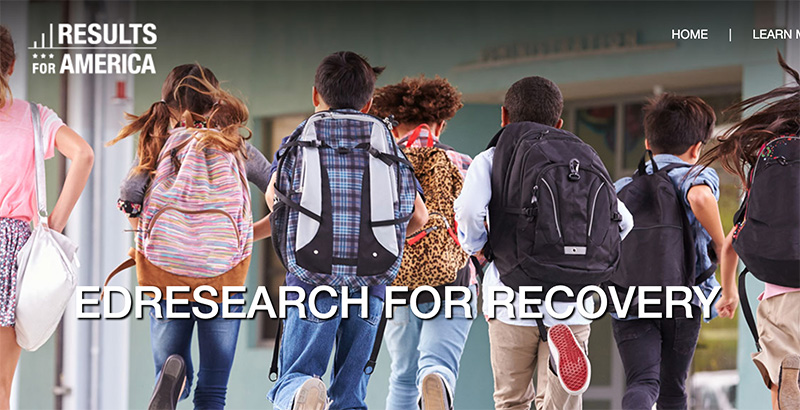Schwartz & Kerr: To Help Guide Decisions About COVID, Schools and Students, Researchers Are Compiling Decades of Data in Easy-to-Read Briefs. Here’s Some of What They’ve Found

In recent months, as schools nationwide scrambled to respond to the challenges posed by COVID-19, state and local education leaders have reached out to ask us: What does research say about how to prevent learning loss? About how to prepare teachers for distance learning? About how to address the mental health and other needs of students and educators during a crisis? About how to reduce the impact of budget cuts?
We’ve fielded dozens of questions like these from state education agencies, school districts, education organizations and advocacy groups. Education leaders and practitioners are under enormous pressure, facing some of the most complex decisions of their careers. They want to ground their decisions in the best available evidence and data but don’t have time to wade through peer-reviewed papers and randomized controlled trials to find evidence-based answers to these questions.
The good news is that education researchers are eager to sift through decades of research to provide actionable, evidence-based insights to help guide these decisions. In a new project called EdResearch for Recovery, a collaboration of the Annenberg Institute for School Reform at Brown University and Results for America, we crowdsourced the most pressing questions from policymakers, educators, parents and other advocates, and we enlisted leading researchers from across the country to quickly but rigorously synthesize the relevant research into easy-to-digest evidence briefs.
While many challenges facing education leaders are unprecedented, we can learn from evidence generated after previous crises and school disruptions. For example, research on the stress of school closures in Chicago and on the academic impact of Hurricane Katrina found that although students initially experienced some learning loss, losses faded after a year or two when students returned to stable schools. However, losses tended to persist, especially in math, when students re-entered chaotic or hostile environments.
Our new evidence brief on addressing learning loss, co-authored by Elaine Allensworth of the University of Chicago Consortium on School Research, notes that losses for students are likely to be larger in math than English Language Arts but also more responsive to interventions. Evidence suggests that high-dosage tutoring closely tied to classroom content,“acceleration” academies aimed at struggling students, double-dose math classes, strong systems to spot early student warning signs and well-conducted school-based social-emotional interventions could help prevent or lessen severe learning loss.
Some of the findings in the briefs challenge commonly held assumptions about which practices work best. One, by researchers Nathan Jones of Boston University, Sharon Vaughn of the University of Texas at Austin and Lynn Fuchs of Vanderbilt University, suggests that co-teaching — an approach whereby special educators support students with disabilities in the general education classroom — may not prove sufficient to meet the needs of children who regressed during COVID-related distance learning.
Evidence suggests that focusing special educators’ time on small-group or one-to-one interventions three to five times per week, coupled with regular progress monitoring, can help students build reading and math skills. If implemented effectively, these academic and behavioral interventions may still be successfully delivered in a distance learning setting.
Fully understanding the impacts of COVID-19 on students, educators and school systems will require years of data collection and new research, but prior evidence offers important clues that can help decisionmakers adapt their recovery strategies.
For example, we don’t yet know how many recent high school graduates will delay enrolling in college due to concerns about health, financial constraints or online instruction (in normal economic times, just 1 percent to 3 percent of high school seniors take a year off before enrolling in college, although a recent Rand survey found that one-third of surveyed high school principals expect seniors’ postsecondary enrollment to decline). But we do know from research that students who do not start college directly after high school have much lower degree attainment rates.
In their brief, Sade Bonilla of the University of Massachusetts at Amherst, Celeste K. Carruthers of the University of Tennessee at Knoxville and Dominique J. Baker of Southern Methodist University highlight multiple strategies to help students as they transition to college and career, including: making students and families fully aware of all institutional discounts, grants and scholarships; texting students over the summer to reduce “summer melt”; implementing intensive college advising, particularly for low-income and first-generation students; and connecting students to advanced career and technical education. The researchers also caution that reductions in the number of high school counselors due to budget cuts could hinder college enrollment, especially for underserved communities.
Future briefs will address what the evidence tells us about supporting immigrant students and English learners, implementing trauma-responsive educational practices, supporting students experiencing homelessness, preparing teacher candidates whose student teaching was shortened or canceled, adapting data systems to collect the most important data during this period, and helping schools cope with the challenges of budget cuts and staff reductions, among other topics.
Given the immense challenges facing our education system, we can’t afford to let the best research, evidence and data sit on a shelf unused. Starting Friday, July 10, at 12:30 ET, and over the coming weeks, we’ll be hosting events where researchers can join with policymakers, school leaders, teachers, parents, community leaders, philanthropic leaders and other advocates to examine the evidence and discuss the findings and the challenges facing practitioners. Anyone interested in learning more can sign up to receive future briefs and information about upcoming events.
We encourage all education stakeholders to send us feedback and join this evidence-based conversation about how we can help students, educators and schools recover and thrive.
Nate Schwartz is a professor of practice at Brown University’s Annenberg Institute for School Reform. Sara Kerr is vice president of education policy implementation at Results for America.
Get stories like these delivered straight to your inbox. Sign up for The 74 Newsletter

;)

